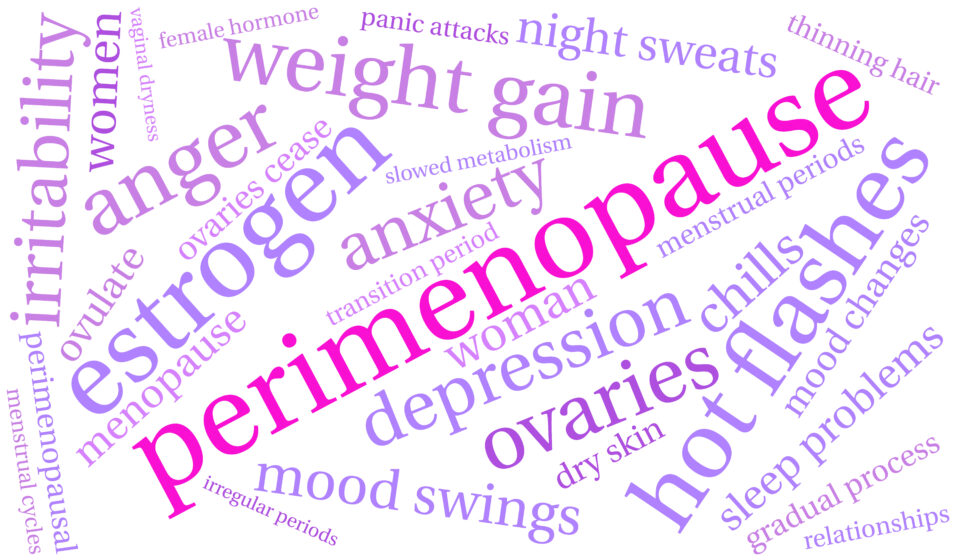
Vagina Whisperer – Perimenopause and Your Pelvic Health
January 1, 2021
Menopause typically starts between the ages of 40 and 60, but the transitional phase called perimenopause can start years earlier.
Hormone Changes
During perimenopause, changes in hormones, menstrual cycles, sleep, mood, hair loss, weight gain, and, of course, pelvic health can occur. Decreased estrogen levels cause menstrual cycles to become less frequent. In addition, dramatic mood swings, difficulty sleeping, depression, and anxiety can affect psychological and emotional well-being.
Many individuals experience these symptoms and do not realize they may be related to perimenopause. Awareness of these hormonal fluctuations can help you take proactive steps to ease the transition. Regular exercise and relaxation exercises, including meditation and yoga, help decrease stress and improve sleep. Working with your medical provider on ways to balance or manage your hormones can also help.
Pelvic health changes related to menopause includes changes in pelvic floor muscle strength, vaginal dryness, and a decrease in sexual desire.
Vaginal Dryness
Decreased estrogen levels contribute to decreased vaginal lubrication and vaginal discharge, as well as vulvar and vaginal dryness. This dryness can contribute to itching or irritation of vulvo-vaginal tissues, increased risk of bacterial infections, and painful sexual intercourse.
My number one tip for women is to moisturize. Using a hormone-free moisturizer, such as Coconut oil, Vitamin E oil, or all-natural balms, can help manage symptoms related to dryness and soothe sensitive tissues.
Pelvic Floor Muscle Weakness
Decreasing estrogen levels also contribute to vaginal tissue thinning and pelvic floor muscle weakness. Your pelvic floor muscles help support your pelvic organs (uterus, bladder, and rectum) and keep the sphincters closed that hold in pee and poop. As perimenopause progresses, increased leaks of urine with coughing, sneezing, laughing or exercise can occur.
Weakness of your pelvic floor muscles can also contribute to pelvic organ prolapse, when the bladder, uterus, or rectum drop down or press into the walls of the vagina. This feels like pressure or heaviness in your pelvis worse with standing or at the end of the day, the sensation of something “falling out” of your vagina, a bulge at the vaginal opening, rubbing on the inside of your vaginal canal, or even incomplete emptying when you pee or poop.
Working with a pelvic floor physical therapist is key to managing prolapse to learn to minimize straining, strengthen your pelvic floor muscles, and modify exercise and activity. A medical provider, such as a urogynecologist, can recommend supportive devices like a pessary or perform surgery if needed.
Sexual Health
Hormonal fluctuations not only decrease sexual desire but also cause vaginal tissues to be thin and dry, leading to pain, burning or even mild bleeding with intercourse. Water-soluble lubricants are recommended for sexual activity and intercourse to minimize friction and improve pleasure. Increased pleasure may also help increase sexual desire.
Your medical provider may recommend a topical hormone replacement to “plump” up the vaginal tissues to improve moisture and comfort. Sexual activity or intercourse should not be painful and if you experience pain with sex, then work with a pelvic floor physical therapist.
Pelvic Floor Physical Therapy
Pelvic floor physical therapists specialize in treating the pelvic floor muscles, which affect bowel, bladder, and sexual health. For women experiencing the symptoms of perimenopause or menopause, physical therapy can strengthen pelvic floor muscles, improve elasticity of the vagina to minimize pain and tearing with intercourse, and help prevent little bladder leaks that increase with aging.
If you experience any of these symptoms, it’s never too late to talk with your medical provider and seek help from a pelvic floor physical therapist. Women often do not discuss these intimate changes; know that you are not alone and there is hope and help available!
 Sara Reardon PT, DPT, WCS, is a board-certified Pelvic Health Physical Therapist and owner of NOLA Pelvic Health.
Sara Reardon PT, DPT, WCS, is a board-certified Pelvic Health Physical Therapist and owner of NOLA Pelvic Health.

